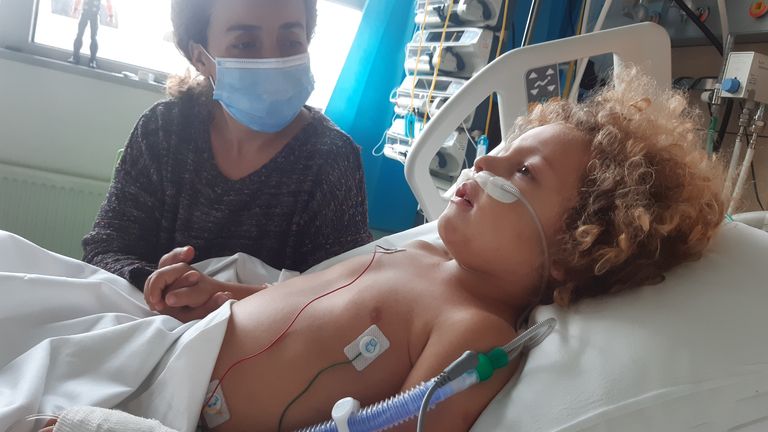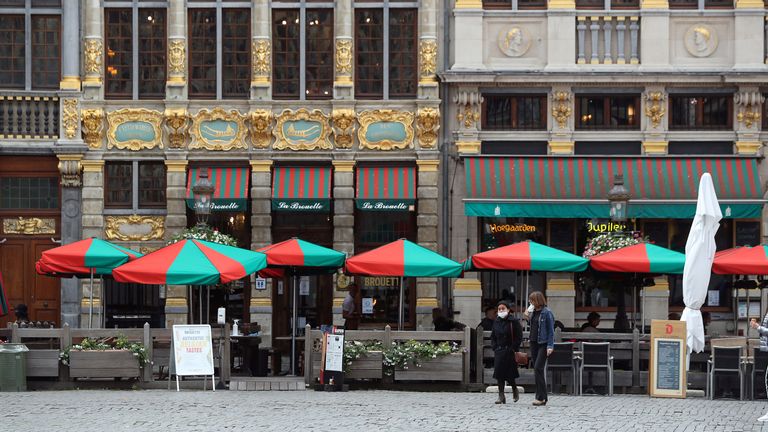The father of a four-year-old Belgian boy who spent six days in a coma after catching COVID-19 has warned other parents of the risk the virus poses to children.
After posting photos of his son Kais in hospital, Gregory Chaudy told Sky News he never imagined his son had contracted coronavirus when he took him there with a temperature.
Doctors initially sent him home - but within days, the little boy had developed blotches on his skin and tested positive for the virus.
Mr Chaudy said: "You see your baby child in this situation and it's very hard to see that. It created many emotions."
Latest coronavirus news from the UK and around the world
When Kais's condition deteriorated, he was placed into a medically induced coma and his parents were "terrified" that he might die. He had no underlying health conditions and was otherwise fit and healthy.
Mr Chaudy said he wanted other parents to be aware that children are vulnerable to the virus, "not only old people".
Kais is now out of his coma and improving, but the Chaudys are among thousands of families in Belgium now being forced to cope with COVID-19 every day.
The virus is rising faster there than almost anywhere else in Europe.
A leading virologist told Sky News the government made a big mistake easing restrictions while experts warned of a second wave.
Professor Marc Van Ranst from KU Leuven University said virologists "had it right".
"And they said, 'okay, there will be a second wave, and it's beginning'. And then the people in the government said 'no, they exaggerate - it's not really that bad. Let's get rid of the measures'. [It was] very populistic, people loved it," he said.
The professor said one of the biggest errors a month ago was to scrap the rule that banned more than five people from gathering.
"Suddenly more people were able to meet more people," he said.
"That is exactly what the virus needs… people meeting people."
Professor Van Ranst said a second wave would still have come to Belgium, but keeping restrictions would have dramatically reduced the numbers affected.
He said: "It's much easier to manage an epidemic where you have, for the size of our country, 500 or 1,000 new cases per day, than when you have 15,000. That makes a big difference."
And now Belgium must brace for the most extreme step: Another national lockdown to control the virus.
Professor Van Ranst acknowledged that may be politically unpalatable, but said he "would have done it yesterday".
"A short lockdown to really bring the numbers down to a manageable level," he suggested.
"Saving Christmas - that would be one of the results that you could have."
New restrictions have been put in place in Belgium. There is a curfew, bars and restaurants have been shut for a month and wearing face coverings in public is again mandatory.
:: Subscribe to Sophy Ridge on Sunday on Apple podcasts, Google podcasts, Spotify, Spreaker
The challenge will be to make people adhere to the rules.
A group of young people have got together in Brussels and produced a video to encourage others their age to wear masks. They come from the densely populated Molenbeek neighbourhood, which has been hit particularly hard.
One of those people, 18-year-old Amina Mohammadi, said: "Personally I don't think it is easy to respect the measures, but we are trying to do our best to protect those closest to us."
Anwar Laarbi Barghou, 19, said the aim of the video was for them to "participate in the fight against COVID-19 and to encourage citizens to protect themselves as much as possible against the virus".
Even with compliance, many think a new national lockdown in Belgium is inevitable.
It may not be popular, but given the virus's spread, it may well be necessary.





